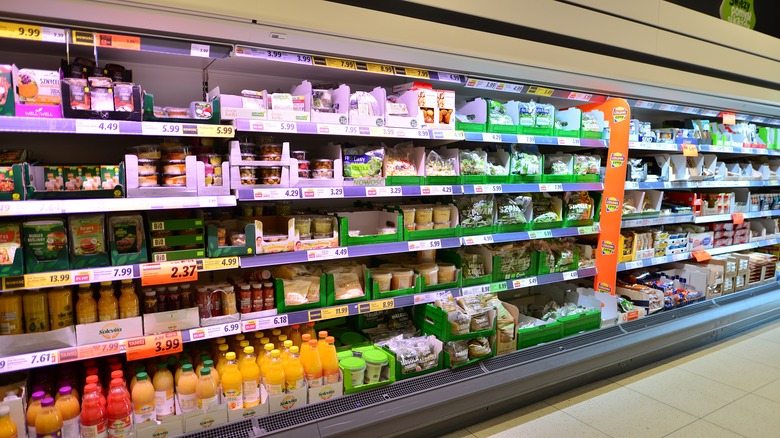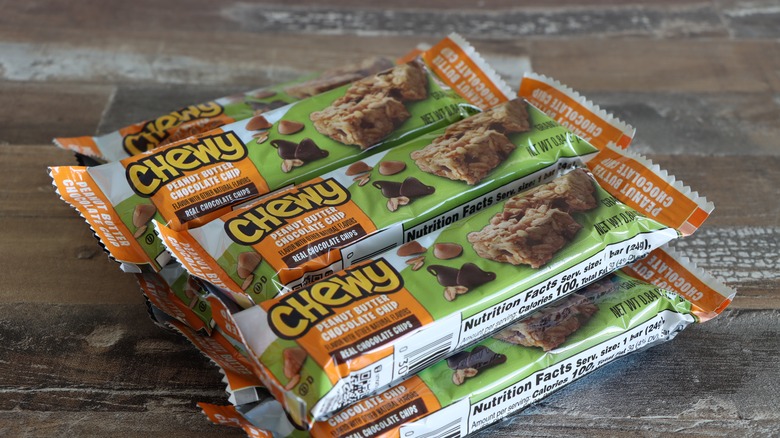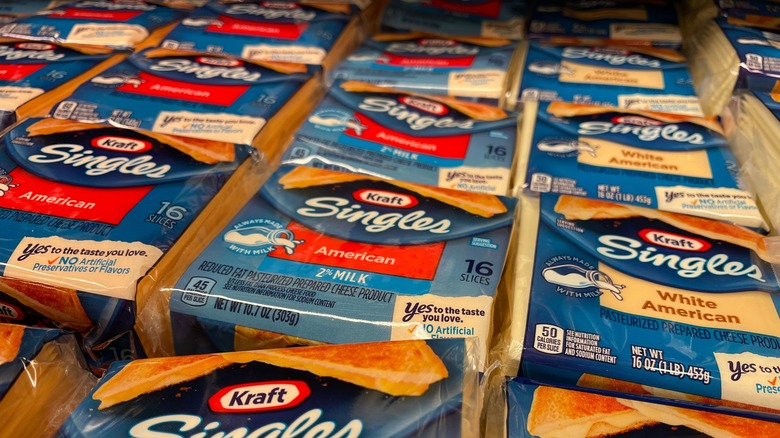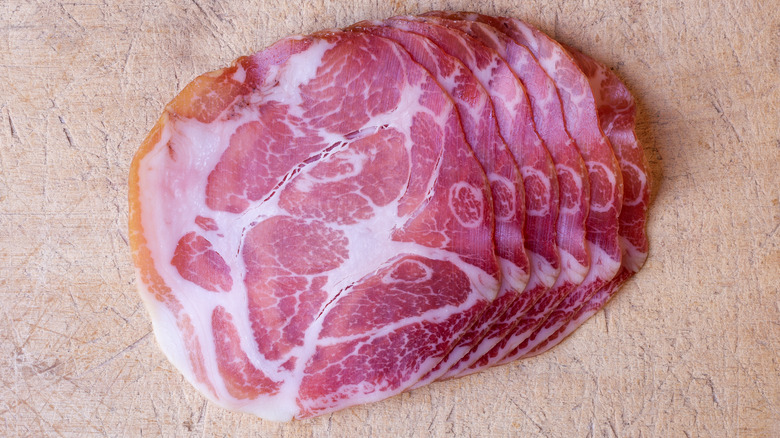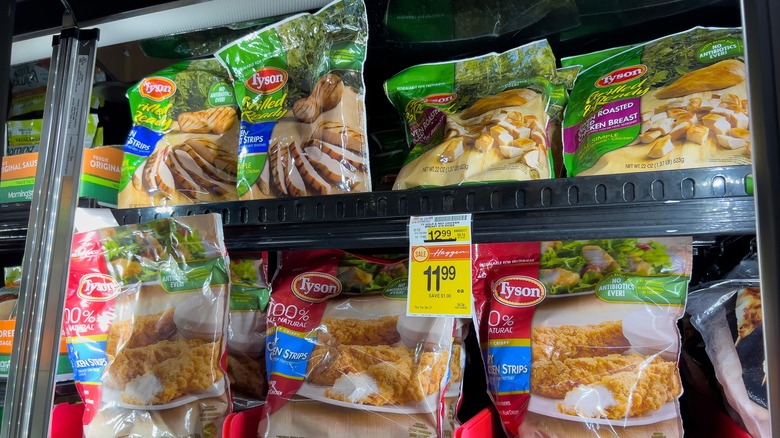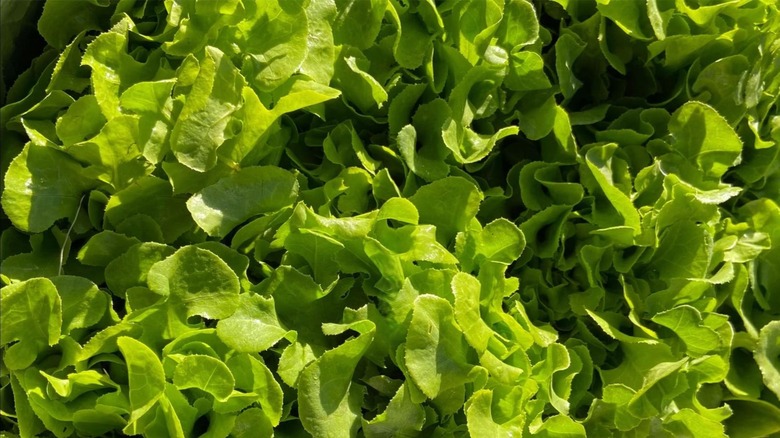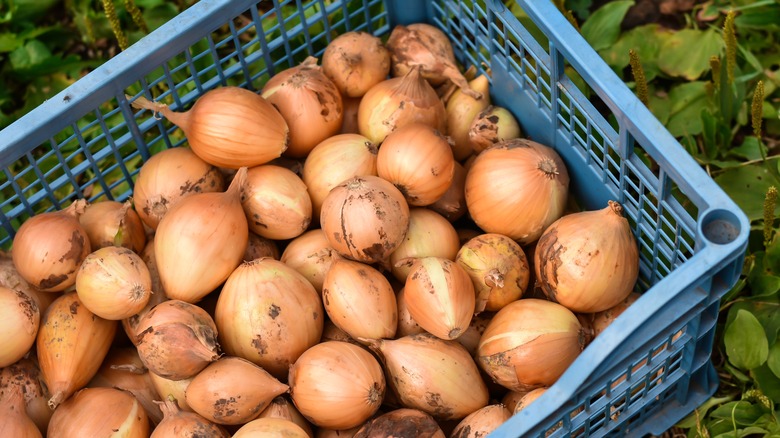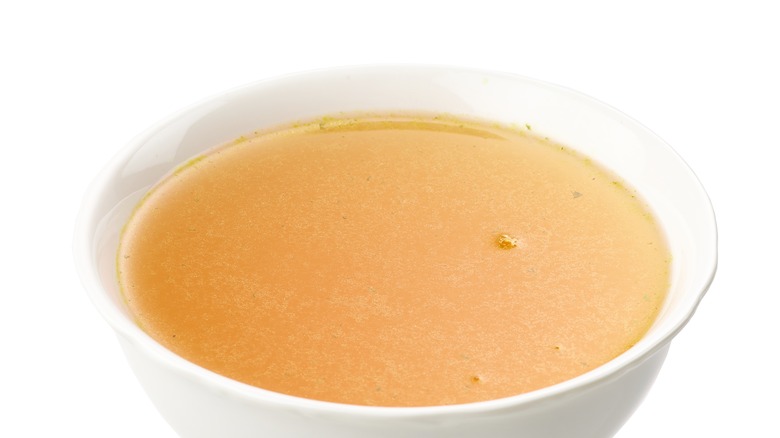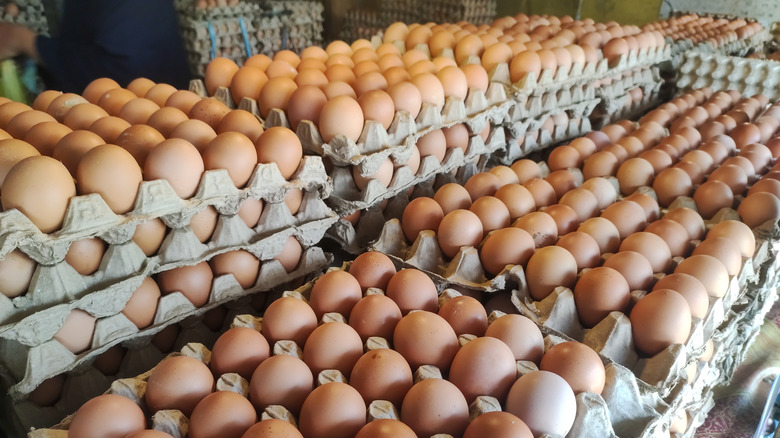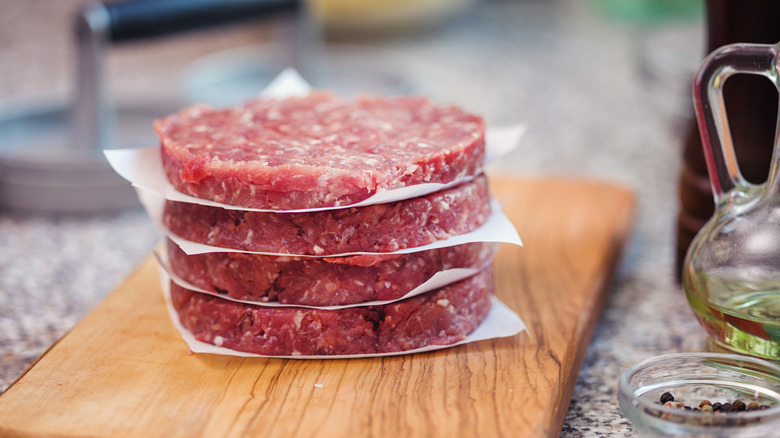The Biggest Recalls In Lidl History
Originally from Germany, the Lidl grocery chain is close to reaching 200 locations in the U.S., though you'll need to be on the East Coast to get your shopping done. Trawling its aisles is a joy, with international goodies mingling with produce, mixes, and the fresh smells of pretzels and bread wafting from the bakery.
Yet like any grocery store, it isn't surprising to encounter recalls on our favorite products. The company has handled a multitude of incidents since launching stateside in 2017, all to varying degrees of danger for its customers. For example, on March 29, 2024, a labeling faux-pas forced stores to pull Deluxe Macarons "Party Edition" off shelves. Since the treats featured major allergens that weren't disclosed to shoppers — wheat and nuts to name a few – shoppers were instructed not to eat them in fear of an adverse reaction.
Whether it's the reach of states affected or the illnesses tallied by health authorities, we've gathered some of the biggest recalls to happen in Lidl's history. To touch on all the bases, past (and even present) controversies from the U.S. and Europe are fair game.
Quaker-brand items potentially harboring salmonella
"Start your day right" is one of the comforting mottos attached to Quaker Oats, a brand long revered for its wholesome breakfast products. A pantry without its famous oatmeal — or instant packets flavored with cinnamon apples or dinosaur eggs — just isn't a pantry we'd consider well-stocked. So you could see why a do-not-eat order on granola bars and Cap'n Crunch would elicit shock. Suspicions of salmonella poisoning jumpstarted a recall effort in December 2023 that, per the FDA, continues to remain in effect on over 90 snacks.
Illnesses from the corrupted items haven't surfaced since the original announcement, which perhaps explains why the FDA decided to label the situation a Class II. The ranking distinguishes this as a matter beneath the most severe, one that doesn't gravely jeopardize one's health. Still, risking this illness is no joke, as it torments victims with nausea, diarrhea, and side effects that can grow more serious with pre-existing ailments. Because of this, sounding the alarm for its customer base was definitely the right move by Lidl, who alerted shoppers to avoid Chewy Granola Bars in Peanut Butter Chocolate Chip, Chocolate Chip, and the Halloween Minis.
Kraft Singles pulled for choking hazard
American cheese possesses an uncannily plastic taste, nobody can deny it. However, it's doubtful Kraft had that in mind when it issued a withdrawal on its processed slices in September 2023. Kraft Singles were culled from the supply chain after the FDA discovered that certain batches were linked to reports of choking. The press release claimed that a machinery error in its production site was causing pieces of the wrapper to stick to the slice, leading customers to gag on the substance without realizing it hadn't been fully peeled off. Since adding synthetic materials is not a grilled cheese hack anybody would crave, the defective allotment — about 83,000 individual slices — was retracted.
To the relief of public health officials, customers were left mostly unscathed by the debacle, though unlucky buyers were highly encouraged to seek a refund at the store where they purchased the marred item. The expiration dates ranged between January 10 to January 27, 2024, for 16-ounce packages, and January 9 to 13, and January 16, 2024, for 3-pound packages. Just about every supermarket retailer in business carries Kraft Singles, and Lidl did its part in eliminating the affected batches.
Over 600,000 pounds of charcuterie meats
A New Year's surprise desired by no one, February 2024 witnessed an assortment of store-bought charcuterie meats blighted by salmonella. Trays of the Antipasto Trio and Traditional Coppa from Lidl originated from the same distributor responsible for the outbreak, Fratelli Beretta USA, Inc., who quickly disposed of the 600,000+ pounds linked to the dangerous bacteria.
The crisis disrupted grocery stores across 33 states, and at least 104 people were sickened in the ordeal. A smaller percentage of cases had to visit the emergency room, which isn't unheard of for salmonella poisoning. Side effects like dehydration, fever, and shortness of breath can definitely impact the immune system differently, displaying temporary discomfort in some and more serious ailments in others.
It's a matter of routine for Lidl to track down shoppers who might have bagged the items not knowing they were soiled. After all, the contaminant is known to linger in cold environments, and these cold cuts were dated best before June 24, 2024. One customer expressed gratitude for this practice, sharing their positive experience of the chain's direct communication with fellow Reddit users.
Soft cheeses sold in America and Mexico
Listeria burrows its way through a variety of foods, but it's apparent that soft cheeses are the pathogen's siren-song. The heavy levels of moisture and cultures make bacteria much harder to stave off, which isn't much of an issue with hard cheeses (think Parmesan). Old Europe Cheese Inc. stocks the shelves of Lidl, Meijer, Safeway, and others, and was forced to toss out Camembert and Brie cheeses in September 2022.
The cheeses impacted by the recall were sold in America and Mexico, featuring best-by dates of September 28 through December 14, 2022. Lidl originally ordered the removal of its 8-ounce Brie rounds, but an addendum on October 5, 2022 expanded the reach to include a selection of baked Brie cheeses as well.
Lasting three months, immediate action taken by the CDC and FDA helped keep this outbreak under control. As for the six people who got sick, all of them recovered. Relief aside, the supplier wasn't let off the hook just yet; the FDA delivered a warning letter the following year lambasting the company for unsanitary conditions that paved the way for the organism to spread.
Close to 9 million pounds of Tyson poultry
Every dining establishment or supermarket you can think of likely gets its poultry from one place: Tyson Foods. No one could have foreseen the pandemonium, then, when a staggering 8,955,296 pounds of chicken got pulled from circulation. In July 2021, health authorities demanded the company retract a wide range of frozen chicken products, including wings and nuggets, out of concern that the meat was carrying listeria. The final toll given by the Food Safety & Inspection Service (FSIS), a division of the USDA, was one death and three people plagued with listeriosis.
The conglomerate is a major player in industrialized food, so no grocery store in America could really go unscathed by the chaos. Lidl responded to the matter quickly, taking the time to notify shoppers and encourage those who'd purchased any item to take it back to the store. What did consumers need to look out for? The total lineup, found on the USDA's website, featured products listed with expiration dates falling anywhere from December 26, 2020, into April 13, 2021. That's four months of potentially soiled frozen food, which highlights why it's important to check labels frequently.
Dole salads tainted with listeria
It's not just eating your greens that's important – washing them is too. Otherwise, you might risk produce ruined with potentially-deadly organisms. Beginning in December 2021, Lidl eliminated 15 salads from its stores out of regards to a broader recall on greens from Dole Fresh Vegetables. The FDA discovered, in procedural fashion, that lettuce blends produced under its watch — specifically, warehouses residing in Yuma, Arizona, and Bessemer City, North Carolina — tested positive for listeria.
To give a sense of the stakes, investigations into the ordeal had been a work in progress for almost a decade. That's right; from 2014 on, CDC officials had encountered people falling ill, without much indication of where the pathogen had originated. From there, around five to six years passed before officials concluded the contaminant came from the facilities in question, leading to the recall's announcement.
As a conclusion to the event, 18 people were sickened overall, with most hospitalized for their illnesses. Sadly, three people died. Can supermarkets ever catch a break from Listeria Monocytogenes? As long as processing facilities keep endangering the masses, invisible pathogens will only continue to multiply (and make us sick).
Salsas linked to massive onion recall
A gigantic recall on red, white, yellow, and sweet yellow alliums rippled through the nation in August 2020, which health experts traced to foodborne illnesses. The allotments were distributed by Thomson International, Inc., and the California manufacturer suspected the produce was tarnished by salmonella. Subsequently, this information was brought to the attention of every grocery outlet and dining establishment in its network, who worked overtime ridding its premises of the loads — weighing between 5 and 50 pounds, respectively.
Being one of its clients, Lidl cautioned buyers on two of its salsas that contained the onions as an ingredient. The dips were produced by one of the store's wholesalers (Lancaster Foods, LLC) and the varieties pulled were Mild Fresh Salsa and Southwestern Salsa. One might assume every jar was a biological hazard, but the store's website was transparent about which lots could be sullied, instructing shoppers to throw out (or exchange for a refund) any jar labeled with an expiration date of August 7 to August 12, 2020. If there's any evidence storing onions wrong can have terrible consequences, the incident poisoned over 1,600 people.
Bone broths, teas, and nut milks
Lidl earns its keep with the affordable practice of private-labeling. This means many processing woes that occur under its name will be blamed, technically, on who was behind the wholesaling. What transpired in September 2023 was a humungous blunder for the guilty party involved, TreeHouse Foods. We're talking about 439,240 lots of cooking broths and oat milks rescinded for "potential microbial contamination," an issue touching every state in the union since the producer's goods are transported to major players in the grocery game. Trader Joe's, Whole Foods, Sprouts, and others all had to enact safety precautions, urging visitors to hold off on the kitchen staples until the problem was resolved.
A single Lidl offering, the32-ounce Organic Low Sodium Chicken Broth, was verified in the recall order — which purchasers, presumably, dumped in lieu of simmering into a hearty fall soup. To date, the pathogen has never been divulged. But what we do know is that one, nobody became sick; and two, TreeHouse Foods endured rough times from the fallout. It rebooted operations at the source — a plant in Cambridge, Maryland — and saw annual profits decline by $34 million dollars. Oof.
Nationwide recall sparked by tainted hummus
With chickpeas, olive oil, and tahini, pureed dips like hummus are exceedingly perishable — and thus primed for risky bacteria. In July 2019, listeria was confirmed in spreads distributed by Pita Pal Foods, a wholesaler responsible for stocking grocery aisles as well as convenience stores throughout the U.S. In addition to a nationwide halt, retailers in the United Arab Emirates were also roped into culling hummus from shelves.
How did the incident come about? Government personnel was assigned a visit to the processor's warehouse in Houston, Texas, and was able to detect signs of the bacteria through rigorous sampling. The low-down on afflicted items posted by the FDA involved Harris Teeter, Fresh Thyme, and Bucee's, plus many more. Lidl's Hummus Quartet was listed, and the notice highlighted containers weighing 16-ounces dated August 10, August 12, and August 29, 2019, with the UPC code 4334035782713.
In general, no illnesses were formally reported, which is to say that if anyone was affected, they were probably able to manage their recovery without the help of a doctor. Still, organisms can live in food for months, so throwing it away ASAP was key.
200 million eggs linked to a salmonella outbreak
In 2018, Lidl was ensnared in a giant egg recall circling back to Rose Acre Farms. On April 13, the Indiana processor released a warning involving over 200 million eggs exhibiting traces of Salmonella Braenderup. This number leaves out the additional 23,400 eggs Cal-Maine Foods removed from its stock following the announcement. Before long, 45 people were left ill as the spread surged through 10 states, including New York and Florida.
In time, details emerged on the health code violations that were uncovered at the company's facility in Hyde County, North Carolina. What the FDA testified to seeing is stomach-churning, to say the least. Revelations exposed by the agency pointed to horrific sanitation, between the dirty floors and filthy equipment to premises overrun by vermin. Officials also knocked workers for abysmal cleanliness habits. In other words, the environment was a petri dish for incubating microorganisms.
Though nobody died, it's still one of the more horrifying food recalls to hit Lidl's shelves. The agribusiness is a top producer for eggs in the country, so by extension, a lot of people were put at risk. Amazingly, it failed to match the numbers of a 2010 egg recall. That total? 550 million.
Hard-boiled eggs in five states
Lidl was part of another recall that struck numerous food retailers and resulted in one death in 2019. Seven cases of listeria poisoning occurred from hard-boiled eggs manufactured by Almark Foods, confirmed through an investigation of the company's Gainesville, Georgia, factory. The announcement on December 20, 2019 was originally limited to the 20- to 25-pound plastic tubs, but within three days, a second round-up was proven necessary to account for additional packaged items primarily sold in the refrigerated and freezer sections.
Brands among the 30,300 pounds disposed of that year included Walmart's Great Value label and O Organics, commonly found at chains like Safeway and Albertsons. Lidl, which came up during the follow-up effort, quickly pulled its 6 Count Stand-Up Pouch Hard-Cooked Eggs out of caution.
Boiling eggs seems like a sensible idea to consumers wary of food poisoning, but it's not foolproof for protecting yourself. Factory-farmed livestock, including chickens, can easily transmit pathogens from their unclean environments, with further troubles brought on by improper pasteurization (the process that makes our eggs safe to consume). This explains why even cooked or peeled whole eggs have to be watched.
Beef swept up in the EU's horse meat scandal
The discovery of horse meat in supply chains traversing Europe was a cataclysmic scandal that aroused global attention in January 2013. In summary? Manufacturers from Ireland and England were dispensing beef goods that, as testing revealed, actually featured equine matter. In some cases, very high levels to boot (the British chain Tesco had hamburgers boasting almost 30%). To put it simply, the findings caused an uproar, with health officials and grocery stores scrambling to remove the mystery meats.
Lidl may be a footnote in this story, yet like all the implicated stores it remains attached to the saga, whether it wants to be or not. On February 18, 2013, Reuters reported that Swedish outposts rid shelves of questionable goulash soups and penne bolognese pastas. Meanwhile in Finland, the offending products included ravioli and a beef goulash meal distributed under the Coquette label.
E. coli-riddled hamburger sickened over a dozen children
Skip the cheeseburger. France was the site of a horrific E. coli outbreak related to Lidl ground beef. The culprit, Steak Country hamburger patties, was delivered via the supplier Company La Societe SEB. Lidl acquired the meat from one facility, but what was notable about the infected beef was that the manufacturer had in turn sourced it from French, Dutch, and German farming sites.
Illnesses appeared mostly in young children. Seven cases were first reported by The Guardian in 2011, but the toll quickly rose to 14, a majority under the age of 8 who in turn suffered grave reactions from the strain. One child died from complications, eight years after contracting the bug. Fallout from the crisis was, of course, inevitable. Guy Lamorlette, head of the manufacturing plant when the spread was happening, was punished and sentenced to two years in prison.
Contaminated cheese that lead to seven deaths
This one hits home for Lidl. Back in January 2010, seven fatalities connected to sour cheeses rocked the discount chain. The cause was listeria, and it had gotten into acid curd cheeses the chain stocked at its German and Austrian locations from Prolactal, an Austrian manufacturer. The company did the responsible thing, ceasing operations at the facility in Hartberg while officials continued to monitor the outbreak.
Past recalls have demonstrated that Lidl moves swiftly in handling chaos, most significantly, giving notice to patrons. In this situation, however, the discount chain dropped the ball massively, as a lawsuit filed by FoodWatch, a consumers' protection firm, aimed to show.
Where did Lidl, as well as the supplier and participating experts fail? By failing to provide broader coverage of the tainted cheese. Besides one region in Germany (Baden Wuerttemberg), most of the country did not receive a warning on the dairy items. The strain infected 45 people, and arguably, that number could have been lower if Lidl had taken better precautions.
